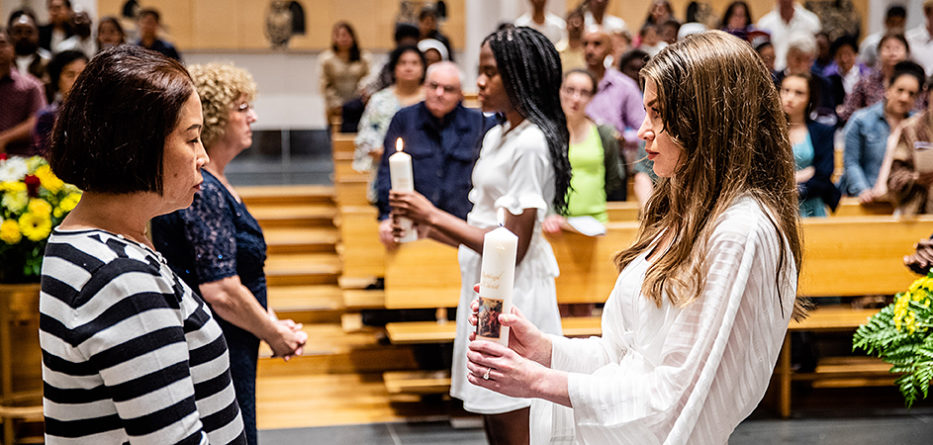Taking off our shoes: A personal reflection on being Church in the 21st Century
By Catherine Whewell
Awareness:
St John the Evangelist tells us that God is love and that wherever there is love, there is God (1 Jn 4:16). He also says that we love because we have been first loved (1 Jn 4: 19). Our capacity for love comes from already being loved. And millions of people throughout this world love deeply, without any awareness of being first loved by God. Love that is God, shown to us in Jesus and moving in and between us through the Holy Spirit, is real outside the knowledge that this love is God. God loves anyway.
I have often heard people say that God can’t act in our lives unless we let God in. Surely God’s love, as the movement of the Holy Spirit, does not depend on my capacity to be aware of or ready to receive that love? Love is always at work around and in our lives, whether we know it or not. However, when I do become aware of the presence of Love, it fans the flames of my own desire to love, it burns away the shame and the egoism that inhibit the full expression of that love. I see people as my sisters and brothers and the earth as our common home. I now belong to a people who proclaim Love at the centre of the Universe. I want to belong to a community with others who also know themselves to be loved, even in frailty, and who find ourselves even more capable of loving this world because we know: we are first loved by God.
The presence of love, our encounters with mystery, fill us up. They touch us deeply without words or explanations. They are generous, can be comforting, can inspire bravery, forgiveness, inclusion, peace in heart and mind. Ultimately, Love brings freedom from all that chains us, enabling us to live in the fullness of life for which we are made. Love desires the wellbeing of the other, as St Paul described in Corinthians.
So, it also puzzles me that, in the Church community, we use language that suggests or pre-supposes ‘not-enoughness’, as the natural stance that we should take with God. Yet we encounter the mystery of being loved without merit, being loved in all our human frailty. Our not-enoughness is true, and yet God disregards what we think of our value in the face of Love and loves us anyway. To God, we are worthy of love. We are even worthy of Jesus’ death on the cross so that we may be saved from what is not Love.
St Iranaeus who famously said “The glory of God is a human being fully alive” also said:
“God did not tell us to follow Him because God needed our help,
but because God knew that loving Him would make us whole.”
God’s energy is towards us, not standing off waiting for us to open up. God is always actively making us whole, whether we know it or not.
So why do we speak of what God wants from us? All God wants, so the Scriptures say on Ash Wednesday, is for us to rend our hearts, not our garments (Jl 2:13), so that we can finally know how frail and loved we are. Would we really rather observe the rituals than break down the barriers between us and discover how Love lives in each other’s lives? To tell each other when we have known suffering and been transformed, when we have forgiven and been freed from the chains of resentment, blame, disconnection; when we have had courage or wisdom and insight, how we have known love, peace and when we have sought justice for our sisters and brothers and our common home, being prepared to change our ways so that others may have lives worthy of their dignity?
Time to talk
It makes a profound difference to celebrate Eucharist with those whose stories we know, whose witness to their faith has been heard or seen. The time for talking is now, but not about the shifts in internal Church life. They are important only insofar as they can enable us to break open our hearts and reach out to each other to hear how God is alive in us, beginning with the shared human experience of mystery.
Since I was 18, I have owned a copy of the Documents of Vatican II. They, along with the extraordinary tradition of love contained in Catholic Social Teaching, have been my companions for 47 years. These documents are an invitation to freedom, to worship as an expression of love and freedom, testament to the transformative power of Jesus’ life, death and resurrection and our response to being loved, by loving others. They contain an incredibly rich understanding about what it means to be human, to work, to have a family, to live well, to care for one another, to seek justice and to live in peace, and to celebrate all of this in the extraordinary Mystery of Jesus self-giving.
In my own spiritual journey, I am learning that, even though it is very clear to me that I am not worthy of the love God showers upon me and the world, luckily for me and for the world, it seems that is not how God sees me, or any of us.
So, if God deems each of us as worthy of great love, mercy and compassion as all the saints, perhaps we could become more compassionate towards each other rather than judging each other in ways God does not judge us?
A few years ago, when I was quite unwell, suffering from debilitating anxiety, I had the great fortune to spend a month alone in Rome, where I wanted to understand what it was in Jesus that inspired the community of disciples to live in the Way. I discovered that every Pope until the early 300’s died as a martyr, so there must have been a compelling reason to belong to this community of faith. It must have been an experience different enough from the social relationships around them, that it was worth dying for. The early Church wasn’t a club; it was an experience of life beyond that of the prevailing culture, and yet lived in the prevailing culture.
I had spent most of my life working for the Church and felt exhausted. I had become afraid of God, who always seemed to want more from me, and seemed to be making demands that I no longer had the energy to fulfil: to love the poor, to challenge injustice in the world and in the Church, to live more faithfully. In my exhausted state, God always seemed to want more. There were always more poor, more injustices to be addressed.
One Saturday morning I happened upon the Sacrament of Reconciliation taking place in the Augustinian Church of St Monica, just near the Vatican. When it came to my turn to speak with a priest, I met a young man who I think was from the Philippines and who, fortunately, spoke English. I spoke to this young priest about my fear of God and he replied, “You are deciding everything for God. Tell God everything you feel and think and let God decide how to respond.”
That was the beginning of healing and from then on, all over Rome, it seemed that there was one message for me from God “Come to me all you who are weary and I will give you rest.” No judgement or requests to be making a difference. Simply the invitation to Come and Rest.
So, the rituals and Sacraments of the Church were part of my healing and I am forever grateful to that young man for his wisdom and his faith in God’s love above all else.
Laboram Instrumentalis, the document to be studied for the forthcoming Plenary Council, begins with the wonderful opening quote from the Vatican II Constitution on the Church in the Modern World:
The joys and the hopes, the griefs and the anxieties of the [people] of this age, especially those who are poor or in any way afflicted, these are the joys and the hopes, griefs and anxieties of the followers of Christ. Indeed, nothing that is truly human fails to raise an echo in their hearts.
Deeper into the document, the prevailing view of the world seems to be only the world’s need for God. The assumption also appears to be that we are the keepers of the Good News. Both statements are true, in part. However, both miss an even more fundamental truth: that the Holy Spirit is already at work, renewing the face of the earth. As Pope Francis said in Dare to Dream, “the world is always being made.” [1] Are we not curious about how and where that is happening? Where are the signs of Love’s solidarity with humanity and all of creation?
During heightened tensions and fighting between Israelis and Palestinians in 2008, like many, I felt a desperation about how this suffering could ever be relieved and resolved. Completely trusting that God is, even there, making something new, I decided (with the help of Google) to find out just how the Holy Spirit is at work.
I found the Parents Circle, a profound initiative of love and reconciliation: (https://www.theparentscircle.org/en/about_eng/)
Israeli and Palestinian parents and other family members who have had a family member killed in the conflict, come together to talk. Their mantra is “It won’t stop until we talk”. Those who join, do so to save other families from losing children, siblings, parents. They see their terrible pain as a shared experience of humanity, even though their loved ones died at the hands of the enemy. They sit with their enemy, bound together by their shared human experience of sorrow and grief from the loss of one they deeply loved. This is a profound work of God in our midst, expressed by people of Jewish and Islamic faiths.
Witnesses to God’s presence in the human experience is not the domain of any particular faith. It is the domain of being human. Love is always making something new where nothing seems possible. We can trust that. So, shall we look for this action of Love around us and support it and help it flourish even more? The huge challenges and deep suffering of the people of Israel and Palestine need the great mystery of Love to shine a light in the darkness. Love for their family members and their kinsmen and women, brought the Parents Circle together from both sides, often against the views of other family members and their communities. They are an extraordinary witness to the power of Love at work in our world.
Perhaps the question guiding the Plenary preparations “What is God asking of us?” could be matched by also asking “What is God doing around us?” Where are the signs of God’s Love moving among us that give us an indication of what we need to follow? Where are we being invited to join in with the work of Love in this world?
We are not the holders of God. The Holy Spirit will blow wherever the face of the earth needs renewing.
Part Three will be published tomorrow.
To read Part One, click here.
Catherine Whewell was Director of People in Ministry and Chancellor in the Catholic Archdiocese of Adelaide. Cathy now works as a leadership coach, specialising in social and emotional intelligence and managing conflict as the space of possibility, via Teams or Zoom or other forms of virtual communication.
[1] Dare to Dream, The Path To A Better Future, Pope Francis December 1, 2020 (p.6)








